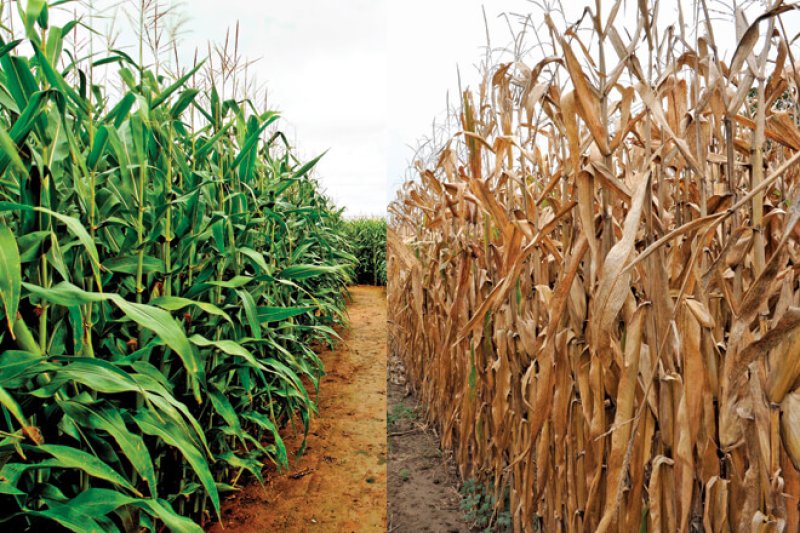The paper, authored by Petra Jorasch of the of the International Seed Federation, expresses concern that climate change is making fewer resources available to feed the world at a time when the population is steadily growing.
It predicts climate change will cause an increase in average global temperature from 14.7 degree Celsius to 16 degree C between 2016 and 2050 as the percentage of global crop production lost to pest attacks nearly doubles, reaching 20 to 25 percent. During that time, the report again predicts, the global demand for water will rise from 3,500 cubic kilometers (km3) to 5,500km3 and the population will grow from 7.3 billion to 9.8 billion.
But the latest plant breeding techniques can help achieve sustainable agricultural production and food security in the light of these challenges—if they are given the chance, the paper says.
It notes some of the contributions that plant breeding tools already have made to agricultural production, including extending shelf life and non-browning in potatoes and mushrooms; improving starch quality in rice, corn and potato; increasing biomass yield in corn under drought stress; improving drought tolerance in soybean, and introducing resistance against viruses and funguses in several vegetables, as well as wheat and potatoes.
“With the new technologies of genome sequencing and the elucidation of gene functions, it was possible to introduce SMART breeding methods that improve the selection process,” writes Jorasch, who is also manager in charge of plant breeding and innovation advocacy at the European Seed Association.
“The new tools of breeding, such as oligonucleotide mutagenesis or CRISPR-Cas, are more helpful than the previous techniques because these tools allow breeders to do their job in an even more precise and efficient manner. Especially the new tools for genome editing, like Crispr–Cas, provide mechanisms to not only randomly increase genetic variation as it was done by radiation or chemical mutagenesis but also to precisely introduce mutations in genes of known functions to either impair or improve their function.”
The report notes the latest breeding methods provide opportunities to target global challenges as well as local needs, but they have to be integrated into pre-existing breeding schemes. “All these molecular precision breeding tools can help to improve specific traits, but they need to be integrated into the breeding cycle. Plant breeding always takes a wholistic approach by looking at all relevant agronomic characteristics.”
Getting plant breeding innovations to Africa
In Africa, an estimated 27 percent of the population—one in every four persons—suffer from hunger. Africa also has the highest population of undernourishment, which in 2016 was estimated to be affecting about 20 percent of the population.
But there are concerns that the plant breeding innovations that could make a difference in Africa are not reaching farmers there. Only two countries on the continent, South Africa and South Sudan, currently grow genetically modified crops and no gene edited crops have yet been proposed for commercialization. However, GM crop trials are ongoing in about 12 countries, which could allow for their introduction. Ghana is expected to soon commercialize GM crops, while Nigeria has already approved the cultivation of insect-resistant Bt cotton and Bt cowpea, its first GMO food crop.
Dr. Rose Gidado, deputy director of the National Biotechnology Development Agency in Nigeria, says more needs to be done to get such technologies to farmers on the continent because they can greatly enhance productivity.
“Commercialization of GMOs in Nigeria will improve agricultural productivity and contribute to the growth of the GDP, which will impact positively on the economy,” she says. “The development of insect- and pest- resistant, nitrogen-use-efficient and herbicide-tolerant crops will cut down production costs. A reduction in production costs will bring about higher profits for farmers and food price stabilization.”
Growing GMOs will help farmers benefit from increased yield and better crop protection from insects and plant diseases, while help also providing improved tolerance to heat, drought and other environmental stressors, Gidado says. GMOs can also help conserve soil energy, reduce greenhouse gases, minimize use of toxic pesticides and protect soil fertility and natural resources.
“Processors will also benefit from improved quality and content of animal feed, food and energy sources,” she adds. “Consumers will benefit from such advantages as increased protein, healthier oils and environmental benefits that will help reduce agriculture’s impact on the land.”
This article originally ran at the Cornell Alliance for Science and has been republished here with permission. Follow the Alliance for Science on Twitter @ScienceAlly.































